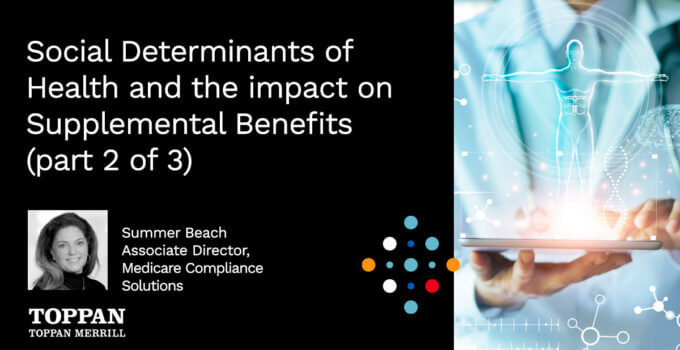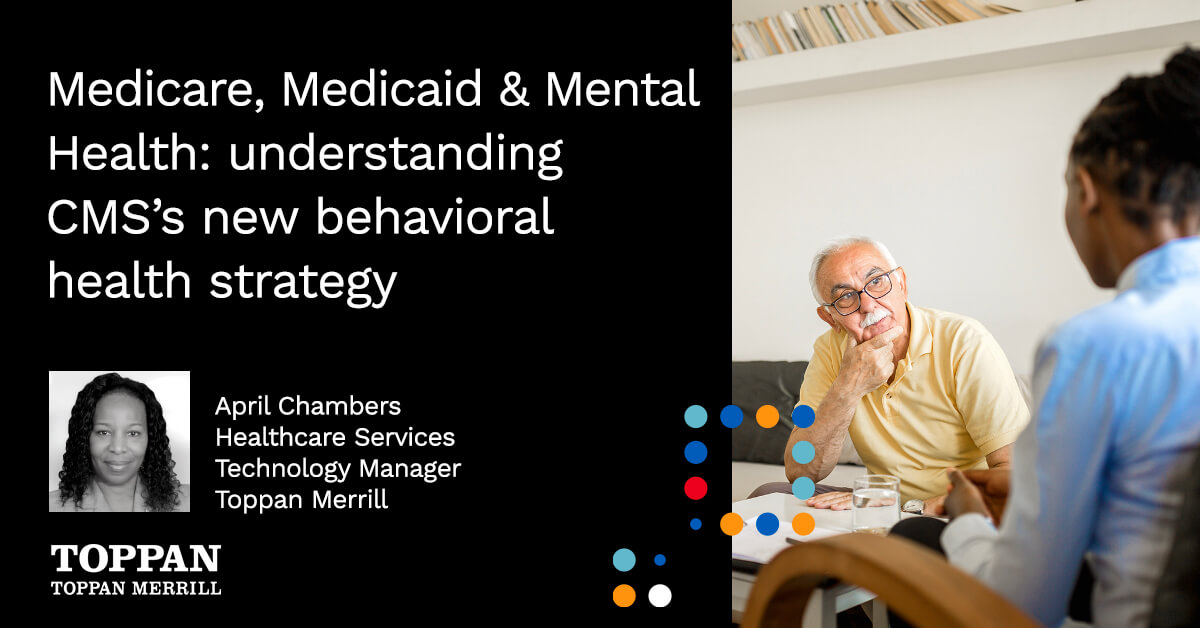Supplemental benefits have a critical impact on Social Determinants of Health (SDOH). These offerings have gained popularity through Medicare Advantage (MA) programs, but their application is not limited to that environment.
At Toppan Merrill, we are exploring these trends in a three-part blog series that explains how SDOH impact supplemental benefits. In our first article, we provide an overview of Supplemental Benefits and Social Determinants of Health. In this article, we look at the impact of those supplemental benefits on SDOH.
Understanding the role of Supplemental Benefits
The Commonwealth Fund has been ranking the healthcare systems of the world’s 11 high-income countries: Australia, Canada, France, Germany, the Netherlands, New Zealand, Norway, Sweden, Switzerland, the United Kingdom, and the United States.
The United States ranks last in every category except “care process,” despite the fact that the country spends a higher percentage of its gross domestic product on healthcare than any other entry on the list — almost 17%, which is twice what other countries on the list spend. The Commonwealth Fund has ranked the U.S. last in the 2021, 2017, 2014, 2010, 2007, 2006, and 2004 editions of its report. Specifically, the U.S. ranks last when it comes to access to care, administrative efficiency, equity, and health care outcomes. The Commonwealth Fund identified four key areas that separate the U.S. from the top-performing countries on the list:
- Universal coverage and reduced cost barriers
- Primary care systems that provide high-value healthcare to everyone
- Reduced administrative burdens
- Investment in social services for citizens of all ages
The Commonwealth Fund includes childcare, community safety, education, housing, mental health, nutrition, and transportation benefits in the social services category. It also notes that the people in the U.S. are sicker on average than citizens of other countries on its list.

The CHRONIC Care Act and the evolution of Supplemental Benefits
Starting in 2019, MA plans gained the ability to offer programs which meet their enrollees’ needs outside of direct health care benefits. Traditionally, these non-medical services were not considered part of medical services and therefore were not offered as part of MA plans. However, that mindset has been shifting as more research shows that meeting social needs, like transportation or nutrition, has a measurable positive impact on health outcomes. Moreover, this improvement in health can lead to lower costs for plan administrators.
In 2019, the Commonwealth Fund looked at Medicare Advantage. It found that roughly 37% of MA plan enrollees had high needs (defined as requiring medical and social support). Examples include poor health, limited education, and lack of finances. The Commonwealth Fund concluded that analysis by saying: “Federal policymakers should consider allowing Medicare Advantage plans to identify high-need beneficiaries based on their medical and social risk factors, rather than just medical diagnoses. Doing so would enable plans to deliver better-targeted services that meet their members’ needs and facilitate implementation of the CHRONIC Care Act provision that allows plans to offer non-health supplemental benefits.”
The passage of the CHRONIC (Creating High-quality Results and Outcomes Necessary to Improve Chronic) Care Act introduced new Medicare Advantage supplemental benefits.

Addressing Social Determinants of Health
The Better Medicare Alliance’s Center for Innovation in Medicare Advantage commissioned a study by NORC at the University of Chicago that found that “recent policy changes specific to Medicare Advantage, including the authority to offer supplemental benefits that are not primarily health-related, have prompted a dramatic increase in plan activity to address social needs, while emerging data technologies and plan data capabilities enable better targeting and delivery of services.”
According to the Commonwealth Fund, by 2020 many MA plans provided traditional supplemental benefits, like vision and fitness. Also, many of these plans have added coverage for certain over-the-counter benefits like sunscreen or first aid supplies. These benefits appeal to a wide audience among enrollees. Offerings like meals and medical transportation are growing in popularity with these MA plan offerings doubling between 2018 and 2020. However, during the same period, the percentage of plans offering palliative care was relatively unchanged (moving to 2% in 2020 from 0.09% in 2018), and by 2020, just 1% of MA plans offered adult day care.
The future of Supplemental Benefits and Social Determinants of Health
This increased attention toward SDOH is promising, but there is still a long way to go. In order to offer the supplemental benefits that positively impact health outcomes, MA plans have to build out the infrastructure and apply the investment to support those offerings. These plans can advertise the supplemental benefits available when marketing their offerings, incentivizing plans to offer supplemental benefits that appeal broadly versus targeting only a smaller subset.
Supplemental benefits are growing in popularity, both within Medicare Advantage programs and in private health insurance plans. As we continue the conversation in the third part of this blog series, we will look to the future of these offerings. In this final installment, we will discuss the trends, opportunities, and challenges in using supplemental benefits to impact SDOH.
How Toppan Merrill can help
Toppan Merrill is the best-in-class partner for complex, secure communications that delivers premier technology driven solutions to more efficiently and accurately communicate mission critical content. Built on the needs of today’s clients and the requirements of tomorrow’s, we deliver a proactive partnership rooted in deep market expertise, flexible solutions built around your business needs, and a commitment to forward-thinking technology that ensures speed, precision and accuracy.
With expertise in health plan regulated communications, Toppan Merrill delivers unmatched service around the world.
Learn more at https://www.toppanmerrill.com/.



